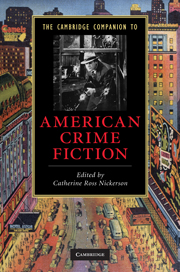Book contents
- Frontmatter
- 1 Introduction: The satisfactions of murder
- 2 Early American crime writing
- 3 Poe and the origins of detective fiction
- 4 Women writers before 1960
- 5 The hard-boiled novel
- 6 The American roman noir
- 7 Teenage detectives and teenage delinquents
- 8 American spy fiction
- 9 The police procedural in literature and on television
- 10 Mafia stories and the American gangster
- 11 True crime
- 12 Race and American crime fiction
- 13 Feminist crime fiction
- 14 Crime in postmodernist fiction
- Guide to reading
- Index
11 - True crime
Published online by Cambridge University Press: 28 September 2010
- Frontmatter
- 1 Introduction: The satisfactions of murder
- 2 Early American crime writing
- 3 Poe and the origins of detective fiction
- 4 Women writers before 1960
- 5 The hard-boiled novel
- 6 The American roman noir
- 7 Teenage detectives and teenage delinquents
- 8 American spy fiction
- 9 The police procedural in literature and on television
- 10 Mafia stories and the American gangster
- 11 True crime
- 12 Race and American crime fiction
- 13 Feminist crime fiction
- 14 Crime in postmodernist fiction
- Guide to reading
- Index
Summary
Over forty-two years ago, Truman Capote wrote a bestselling book, In Cold Blood, and loudly proclaimed that he had invented a newart form. As Capote told George Plimpton in a long interview: “journalism, reportage, could be forced to yield a serious new art form: the 'nonfiction novel,'” and that “a crime, the study of one such, might provide the broad scope I needed to write the kind of book I wanted to write. Moreover, the human heart being what it is, murder was a theme not likely to darken and yellow with time.”
Whether or not Capote invented something called the “nonfiction novel,” he ushered in the serious, extensive, non-fiction treatment of murder. In the years since In Cold Blood appeared, the genre of true crime regularly appears on the bestseller list. It is related to crime fiction, certainly - but it might equally well be grouped with documentary or read alongside romance fiction. And while its readers have a deep engagement with the genre that is very different from the engagement of readers of crime fiction, its writers are often forced to occupy a position - in relation to victims, criminals and police - that is complex and contradictory. In this essay I will be tracing the history and development of this hybrid genre, as well as examining some of the tensions - between reader, writer, criminal and cops - that are at its heart.
In Cold Blood made reading about gory crime - in this case, the random murder of a farm family in Holcomb, Kansas - respectable. Moreover, despite its French epigraph it insisted on the Americanness of the victims - and the killers. It ushered in a theme which has since been richly mined by true crime authors: that violent crime is an act that can fundamentally reshape a community and create or lay bare the unspoken fears between members of that community.
- Type
- Chapter
- Information
- The Cambridge Companion to American Crime Fiction , pp. 121 - 134Publisher: Cambridge University PressPrint publication year: 2010
- 4
- Cited by



